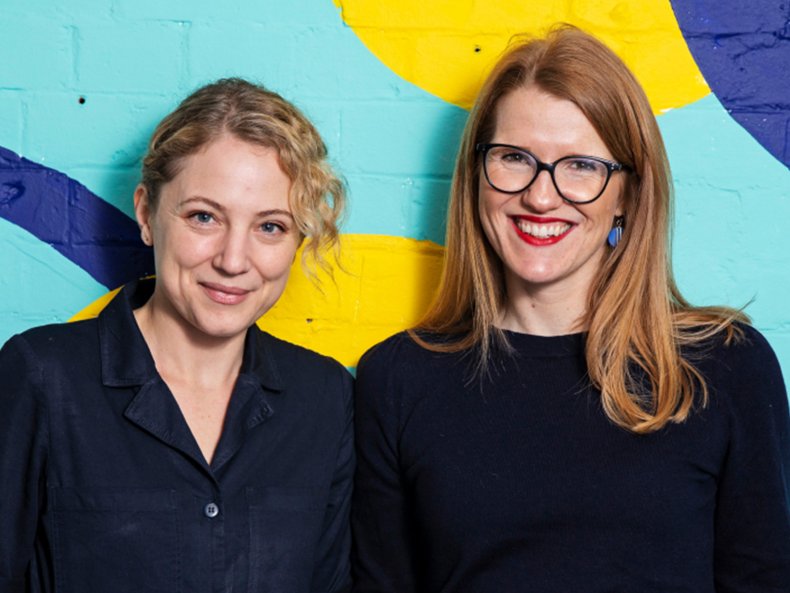Table of Contents
Born between 1996 and 2012, Generation Z, or Gen Z as they’re more commonly referred to online, like to do things differently.
Frequently associated with Instagram, avocado toast, and living with their parents, what really separates Gen Z’ers from their older counterparts is their attitude towards careers and life paths.
Findings have revealed that a growing chunk of this cohort are rejecting conventional and linear pathways, abandoning traditional career ladders, to regularly dart between roles, industries, and locations.
The phenomenon has been coined “the squiggly career”, by authors Helen Tupper and Sarah Ellis, who both ditched London’s rat race to co-launch a podcast, write a book, and build a company to champion this very message.
What Is A Squiggly Career?
“A squiggly career is a career that’s full of change and challenge, options and opportunities,” Tupper told Newsweek. “It’s effectively a career that is not linear in nature, and where people can develop in different directions. There is not a one-size-fits-all version of success,” she added.
“We’re trying to help people start with success for themselves, rather than try to force fit somebody else’s definition onto their development. That’s what “squiggly careers” are about. They are more reflective of the reality of work that’s full of change, and more reflective of our individuality at work because it’s as unique as you are,” Tupper continued.
Victoria McLean, founder and CEO of career coaching service City CV echoes Tupper’s sentiment – though with some skepticism. McLean told Newsweek: “A squiggly career has twists and turns, and depending on the sort of person you are, that can either seem like an exciting adventure or a confusing career approach that doesn’t seem to have an end goal”.

Why Is There A Stigma Around Squiggly Careers?
As Tupper puts it, so-called “squigglers” prioritize the freedom to move between different industries and locations in pursuit of their authentic passions, yet this growing rejection of the expectations upheld by the older generation is still being judged and stigmatized.
“The legacy of the ‘career ladder’ is strong,” said Tupper. “The legacy is also in the language that we use. People will talk about ‘stepping up’ and ‘stepping down’ in conversations, or they’ll talk about career plans, or job titles, and all that stuff is very ladder-like. It’s very embedded in a lot of organizations,” she added.
Tupper went on to tell Newsweek: “You now have younger generations who don’t want the ladder and have never really experienced the ladder almost confronting people who’ve only ever known the ladder. I think that creates a little bit of tension. That person who’s worked in an organization for a long time and is very familiar with the ladder for being a good definition of career development will then feel quite vulnerable”.

Gen Z’ers make up around 2 billion of the world’s population, boast $7 trillion or more in purchasing influence, and are expected to make up to 27% of the global workforce by 2025. Tupper argues that this pending reality could be why older professionals, who have been sitting comfortably on their ladders for years, could be feeling hesitant to accept this new approach to work and life.
The disparity between the demographic cohorts is indisputable. A 2022 report revealed that Gen Z and their slightly older counterpart Millennials, people born between 1981 and 1996, are more likely to have a side hustle than Gen X and Boomers. In fact, 59% of Gen Z’ers are likely to have a side hustle as opposed to only 22% of Boomers.
In the wake of the COVID-19 pandemic, thousands of Gen Z’ers hungry to add more meaning to their lives quit their jobs, literally, in what became known as ‘The Great Resignation’ and subliminally, in what became known as ‘quiet quitting’. As discussions around burnout grew in popularity, a mass interest in the gig economy, being your own boss, and freelancing rose.
‘I Quit My 9-5 and Became An Influencer…My Parents Thought I Was Crazy!’
Sophie Knight is a fashion content creator based in London. After five years of working in insurance, a pathway that she told Newsweek she chose for its “stability” and not due to a personal interest in the field, she quit her 9 to 5 and went on to develop a career in online influencing. Since departing from the corporate world and rejecting the traditional career ladder, Knight has enjoyed success by growing a large following on her blog and Instagram page, @SophieLouisesDiary.
“My parents thought I was crazy,” she told Newsweek of her parents’ reaction to her quitting her insurance role to pursue her side hustle.

“After graduating from university, I had felt a huge pressure to find a stable job as soon as possible,” she added.
Knight went on to tell Newsweek: “[My parents] always encouraged me to pursue a traditional career in law or accountancy. I’ve found in the past people have made lots of assumptions before meeting me. These assumptions are often to do with my personality or my lifestyle. When I first started out as a full-time influencer, and even occasionally nowadays, I get people jokingly asking me when I’m going to get a job!”
‘I’m A Self-Confessed Squiggler—I Switched Jobs 7 Times Before Leaving My Corporate Role For Good’
Stefanie Sword-Williams, originally from Leeds, devised F*** Being Humble while working full-time in the rigorous advertising industry, and after stocking up enough bookings quit her demanding 9 to 5, published a book, and pursued her brand.
Sword-Williams is a self-confessed “squiggler”, having switched jobs “six or seven times” before leaving her corporate role for good.

She amplifies the benefits of having a “squiggly career” and told Newsweek: “One of the businesses that I worked at prided themselves on having such a diverse range of staff from different disciplines. One person used to work at a news outlet, another taught yoga in Thailand. They loved using that as part of their storytelling. It was a selling tool, rather than everybody at the business having had a linear career”.
“I think the reason we’re seeing more “squigglers” is because the older, more linear, structural corporate ladder, and the people that drive that mentality are essentially slowly fading out as a generation,” Sword-Williams said.
“After millennials, Gen Z will be the next workforce. I think that it makes sense that millennials were on that cusp of ‘climb the ladder or start a side hustle’. I think that’s why so many millennials have kind of panicked because they don’t know where the best place to be for them is,” she added.
“Our parents’ generations are still very much in the corporate world, ‘get a job and you’ll get a pension by the end of it’. With Gen Z, I think that the biggest thing that has changed their working outlook has been the internet, the internet and social media”.
‘We’ve Seen Previous Generations Go Through Conventional Careers To Fit Into A Box—We’ve Decided That’s Not For Us’
Host of The Psychology Of Your 20’s podcast, and Gen Z-er, Jemma Sbeghen told Newsweek: “I think this generation has been introduced to a new way of working that is no longer traditional”.

“We’ve seen previous generations go through conventional careers and fit into a box and have decided that’s not for us,” she added. “Alongside this, the usage of social media has allowed us to see what else is out there and has introduced us to attractive new opportunities”.
Sbeghen argues that this generation’s lived experience of growing up online and seeing many opportunities and realities played out on the internet, has made it almost impossible for young people to want to fit inside a stuffy box and do as they’re expected.
‘If They Don’t Allow You To Have A Side Hustle, Are They The Right Employer For You?’
As for Sword-Williams, after plenty of travel and movement within her career and personal life, she feels that the number one quality she’s acquired from being a “squiggler” has been her adaptability and her ability to confidently self-promote her skills.
“…Adaptability, ability to communicate, and self-promote are massive. If you’re moving jobs regularly, you have to understand how to self-promote, which again, when you stay in one role at one company for years, you’re less likely to have to self-promote,” Sword-Williams said.

It’s this adaptability that Sword-Williams believes bosses should be encouraging, or else they’re likely to disillusion their younger staff and prompt them to leave.
“Some of the development skills that you could grow through hobbies and side hustles can be transformative to the way that you perform in the workplace, but if we tell people that they can’t do that, what they end up feeling is trapped, underwhelmed, and as part of a rat race,” Sword-Williams told Newsweek.
“That can be problematic because people end up leaving. It’s important to find employers that match your values. If you have side hustles, communities, passions that you want to explore outside of work, and that isn’t being welcomed, then it is down to you to assess whether that company is the right fit for you,” she added.
Tired Of Your Corporate Job? Here’s How To Pursue A “Squiggly Career”
Catri Barrett is a certified life coach based in the UK. She outlined to Newsweek the steps that she advises people diligently take if they’re planning to ditch the traditional career ladder and try something new.

Catri Barrett
How To Become A “Squiggler”, According To A Life Coach:
1. Start off by embarking on a side hustle or new passion and go part-time before fully committing.
2. Bridge together your 9 to 5 and your budding side hustle.
3. Leverage your current networks and navigate events were people in your ideal career circle would be in attendance.
4. Don’t be fooled by social media.
5. Know the risks and don’t see “squiggling” as being the easy option or your ticket out of the rat race. Leaving the security of a salaried job comes with challenges and building up a successful freelance career or your own business will take time.
6. Don’t be hard on yourself. Know that doing all of the above takes a level of confidence and resilience, and putting yourself out there to find new opportunities and go against the grain means developing unshakeable self-belief and confidence in what you’re doing.
7. There is no such thing as the ‘right’ or ‘perfect’ job, and waiting for it to come along can have a huge negative impact on your progress.
If you have a personal dilemma, let us know via [email protected]. We can ask experts for advice on relationships, family, friends, money and work and your story could be featured on Newsweek’s “What Should I Do? section.

